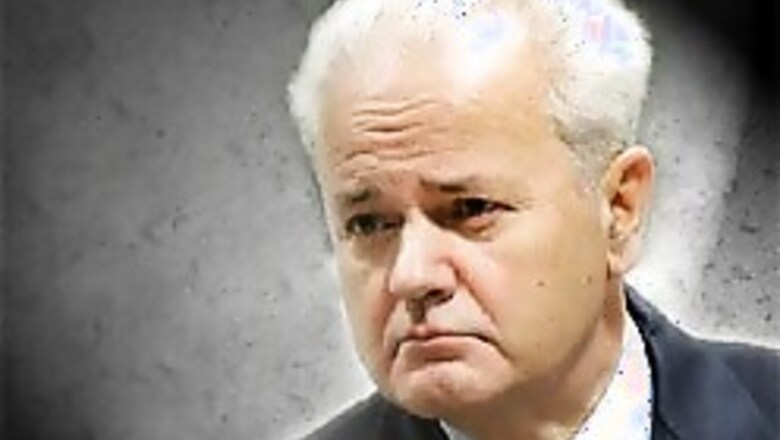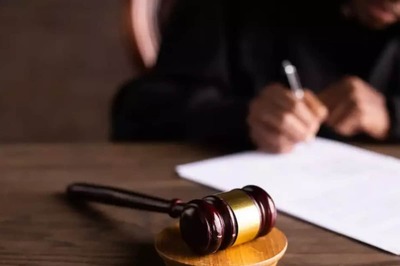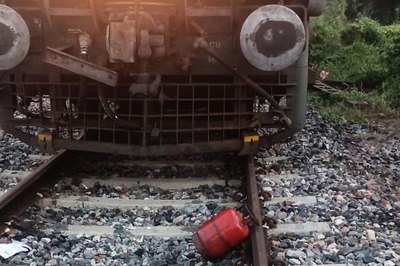
views
The Hague, (Netherlands): The son of Slobodan Milosevic was expected to pick up the body of his father on Tuesday as questions swirled over the cause of the former Yugoslav leader's death.
Marko Milosevic was heading from his Russian exile to the Netherlands to collect his father's body for burial. But where the funeral will be held remained up in the air.
The Milosevic family has sought a funeral in Belgrade -- a prospect that would become more likely if a Serbian court withdraws an arrest warrant for Milosevic's widow.
But on Tuesday, Marko Milosevic said Serb authorities were blocking a Belgrade funeral and that the family would seek to hold it in Moscow, Reuters reported.
Belgrade is the capital of Serbia and was the capital of the former Yugoslavia.
The questions circling around a Milosevic funeral came as theories remained over the cause of the former Yugoslav leader's death on Saturday.
News services on Monday quoted a Dutch toxicologist as saying he had found the antibiotic rifampicin in Milosevic's bloodstream in tests conducted earlier this year.
The toxicologist, Donald Uges of Groningen University, also said doctors at the detention center concluded Milosevic had obtained the powerful bacteriocidal antibiotic and had been administering it himself.
Rifampicin is known to reduce the effectiveness of blood pressure medication.
A lawyer for Milosevic on Monday denied news reports that Milosevic altered his medication to discredit medical care at his Dutch detention center so he could be allowed to seek treatment in Russia.
Zdenko Tomanovic said Milosevic, who died in his cell at age 64, did not medicate himself with rifampicin -- used in the treatment of leprosy and tuberculosis.
"Mr. Milosevic said he had never used any medicine against leprosy or tuberculosis," Tomanovic told CNN in The Hague, where Milosevic was on trial for war crimes from the Balkan wars of the 1990s.
"He asked, 'How are they finding in my blood this drug if I have never used this drug?'"
Russia was sending a medical team to The Hague to examine post-mortem results after expressing doubts about the war crimes tribunal's investigation into Milosevic's death.
The tribunal met Tuesday to formally close the 4-year-old Milosevic trial.
Milosevic had complained he was not receiving proper medical care at the detention center, and two days before his death had asked for a recess in the trial so he could be taken for treatment in Russia. The tribunal refused the request.
PAGE_BREAK
Milosevic contended he was being poisoned.
"One issue is whether Mr. Milosevic's claim that he was being poisoned is justified or not," Tomanovic said. "The central issue is whether or not Mr. Milosevic had appropriate medical care."
The Associated Press reported that Dutch toxicologist Uges had asked for the tests in February after Milosevic's blood pressure failed to respond to medication given by doctors at the detention center.
Uges said rifampicin "makes the liver extremely active. If you're taking something (another medication) it breaks down very quickly," he told AP.
Uges told Reuters he believed Milosevic took the drugs himself to try to prove that his medical care at The Hague was inadequate.
"I am so sure there is no murder. There is not any reason for that," he said.
"I don't think he took his medicines for suicide -- only for his trip to Moscow. When he was in Moscow he would be free. That is where his friends and family are. I think that was his last possibility to escape the Hague," Uges said.
It was not the first time doctors suspected Milosevic of self-medicating.
Trial transcripts from August reveal that doctors had found traces of benzodiazepines, used to counter stress, in his bloodstream "which is odd given the patient's refusals to take benzodiazepines from the United Nations' unit staff," according to a report from a Dr. Dijkman.
Dijkman also suggested "that the accused must have obtained and be taking drugs other than those prescribed in some other way," the transcript said.
The toxicology report from Milosevic's autopsy was not due before Tuesday.
Preliminary autopsy results released late Sunday indicated that the former Yugoslav president died of a heart attack, according to a spokeswoman for the UN war crimes tribunal.
Two pathologists from Belgrade attended the autopsy and gave the tribunal a summary, said spokeswoman Alexandra Milenov.
"According to the pathologists, the cause of death was a myocardial infarction," or heart attack, she said.
PAGE_BREAK
The pathologists also said two heart conditions the former leader suffered from "would explain the myocardial infarction," according to Milenov.
She said a final report would not be complete for several days.
Dutch Foreign Ministry spokesman Dirk-Jan Vermeij, speaking after the Russian report, said four Russian doctors have been given seven-day visas to come to The Hague to study the results of the autopsy.
Milosevic, nicknamed the "Butcher of the Balkans," was on trial for 66 counts of genocide, crimes against humanity and war crimes in the Balkans during the 1990s.
His death came just a few months before the expected conclusion of his trial, which had lasted more than four years.
U.N. war crimes prosecutor Carla del Ponte expressed regret and frustration that Milosevic died before his trial was ended and a verdict reached.
"It deprives the victims of the justice they need and deserve," she told reporters. "What they are asking for is that justice be done, and now it will not be possible."
Judge Fausto Pocar, the president of the International Criminal Tribunal for the Former Yugoslavia, also said the death shortchanged victims and their families.
"It is extremely unfortunate that the victims and their families will not have a final answer in this case," he said.

















Comments
0 comment